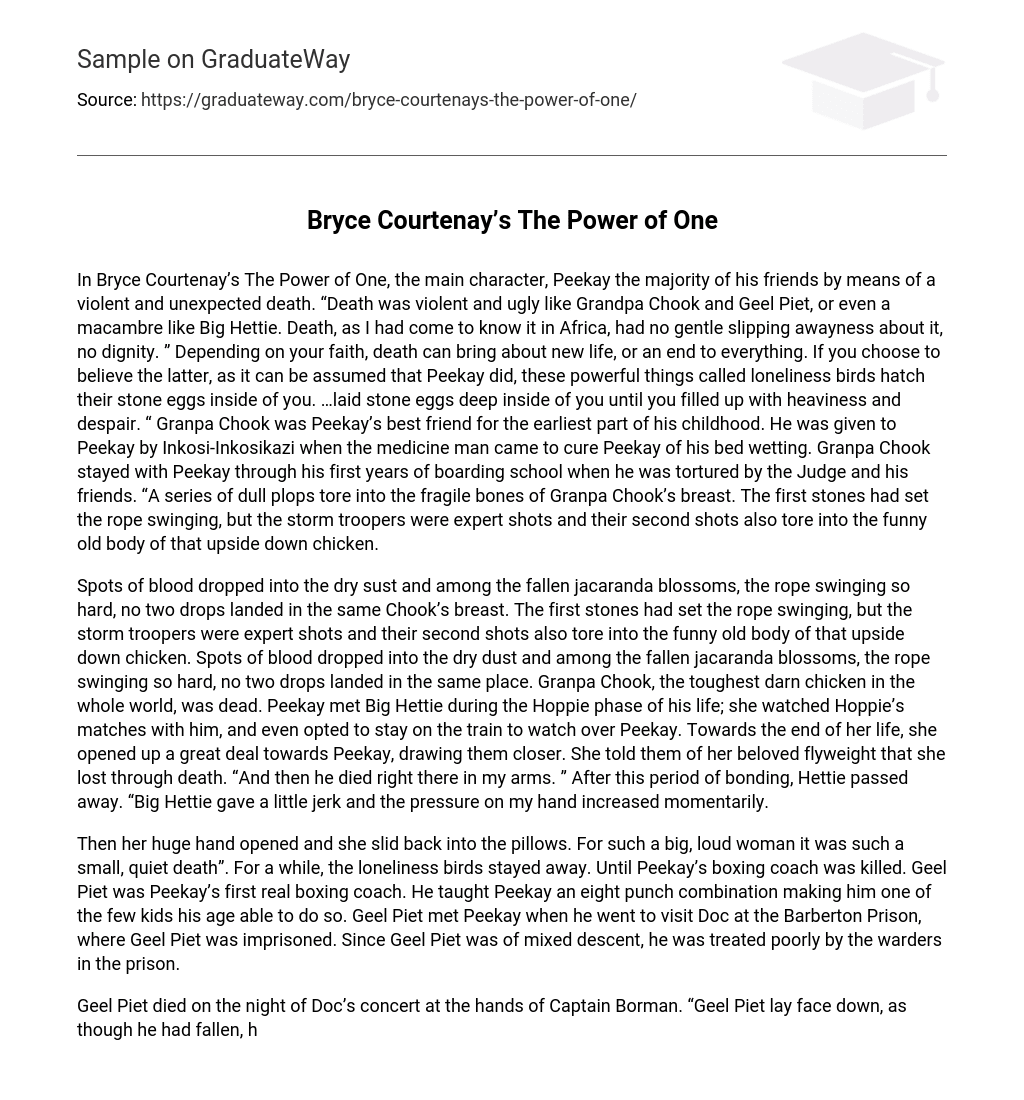In Bryce Courtenay’s The Power of One, the protagonist, Peekay, experienced the loss of most of his friends through violent and unexpected deaths. He describes death as being violent and unpleasant, comparing it to his relatives Grandpa Chook and Geel Piet, or even the horrifying Big Hettie. The way he had come to understand death in Africa was that it lacked a peacefulness or dignity associated with slipping away. Depending on one’s beliefs, death can result in new beginnings or the complete cessation of existence. It can be inferred that Peekay subscribed to the latter notion, as he believed that loneliness birds would lay stone eggs deep within oneself, gradually causing a heavy and despairing feeling to take hold.
During the early years of Peekay’s childhood, Granpa Chook had been his closest companion. Inkosi-Inkosikazi had given the chicken to Peekay as a gift while the medicine man visited to treat him for bed-wetting. Throughout Peekay’s initial years at boarding school, Granpa Chook remained by his side even when he was tormented by the Judge and his cronies. “Granpa Chook’s fragile bones were pierced by a succession of dull thuds. The first stones began to make the rope sway, but the storm troopers were skilled marksmen, and their subsequent shots also pierced the peculiar, inverted body of that chicken.”
Blood droplets splattered onto the arid ground and mingled with the fallen jacaranda blossoms as the rope swung violently, causing each drop to land in a different location on the hanging chicken’s chest. The initial stones set the rope in motion, but the highly skilled storm troopers unleashed a second onslaught, inflicting more damage upon the peculiar, inverted body of the fowl. Droplets of blood fell amidst the parched dust and scattered jacaranda petals while the rope continued its frenetic sway, never allowing two drops to fall in the same spot.
Granpa Chook, the toughest chicken in the world, had passed away. During Peekay’s Hoppie phase, he met Big Hettie. She would join him to watch Hoppie’s matches and even stayed on the train to take care of Peekay. As her life neared its end, she opened up and became closer to Peekay. She shared the story of her lost flyweight, who died in her arms. After building this connection, Hettie also passed away. “Big Hettie gave a small jerk and the pressure on my hand momentarily increased,” marking her departure.
Then, her enormous hand opened and she slipped back into the softness of the pillows. Despite her size and loudness, her death was surprisingly small and silent. The emptiness birds avoided me for a while, until the day my boxing coach was killed. Geel Piet was not just any coach; he was my very first real coach who taught me an impressive combination of eight punches. This made me one of the few kids my age with such skills. I first met Geel Piet when I visited Doc at the Barberton Prison, where he was serving his sentence. Unfortunately, Geel Piet faced mistreatment from the prison warders due to his mixed ancestry.
Geel Piet was killed by Captain Borman on the night of Doc’s concert. Geel Piet’s body was found lying face down, with arms outstretched and his head in a pool of blood from hemorrhaging from the nose and mouth. Doc, a German professor, had taken Peekay under his wing and taught him extensively. Despite their numerous adventures together, Doc was growing old and nearing death, a realization that Peekay found too difficult to bear.
The thought of him growing old and unable to do what we had always done together had crossed my mind before, but I never imagined that he would just vanish, not be there anymore, and not be a part of my life. During Peekay and Doc’s final adventure, they discovered the crystal cave of Africa. It was during this experience that Peekay came to realize that his time with Doc was coming to an end. Following a confrontation with Gideon, Mrs. Boxall called Peekay to inform him that Doc had gone missing. He had been absent for a considerable amount of time, and Peekay knew that he must have passed away. Doc’s death taught Peekay that death can take various forms and isn’t always violent or grotesque.
Death is a formidable force, capable of striking at any given moment. It does not discriminate, as even those whom Peekay loved and cherished fell victim to it. However, when the birds of loneliness departed, Peekay found himself liberated to love whoever he desired. This newfound freedom allowed him to perceive the world with clarity. “I granted myself the right to love anyone I pleased. The ties that kept me bound to the past were severed,” he realized. “I knew that once the birds with their bone-like beaks returned, I would be in command, no longer a servant to loneliness.” It may seem implausible for a six-year-old to possess such thoughts, but the truth remains that it did happen.





